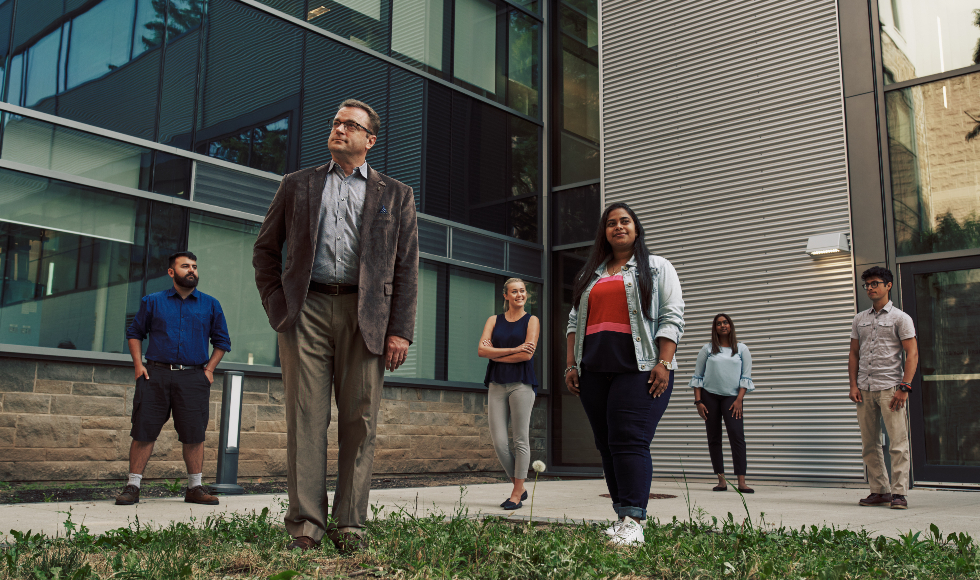Rising to the challenge: New McMaster Grand Challenges Scholars Program launched

Photo by Jin Lee
Young people who will tackle tomorrow’s thorny global problems will need both superlative technical skills and a range of problem-solving skills.
That’s the philosophy behind the newly launched McMaster Grand Challenges Scholars Program, an initiative aiming to enhance graduates’ ability to drive real, sustainable change in the face of 21st century challenges.
The Grand Challenges program builds on the strengths of MacChangers, a co-curricular program led by the Faculty of Engineering and the MacPherson Institute, which brings together teams of students from across campus to seek local solutions to challenging societal issues.
It’s just the latest way McMaster Engineering is transforming the student experience and amplifying experiential learning, says Ishwar K. Puri, Dean of Engineering.
“We know that the world is changing at a rapid rate and so we need to prepare students to be agile thinkers and strong communicators who are capable of shaping the future, rather than just chasing it,” Puri says. “We want to ensure that every student graduating from McMaster Engineering is a resilient, calculated risk-taker who can impact the world.”
Following a framework developed by the US National Academy of Engineering, the Grand Challenges Scholars Program is offered at more than 60 American universities, including MIT, Duke, Georgia Tech, Virginia, Maryland, Ohio State and the University of Southern California.
McMaster is the first Canadian university to be accepted into the program, joining eight other non-U.S. schools, including Australian National University, City University of Hong Kong, and the National University of Singapore.
While the American version of the program focuses students on very specific goals, the McMaster version encourages students to look for problems that address the UN Sustainable Development goals., which range from eradicating poverty to climate action to improving water quality and good health and well-being.
To complete the program and earn a digital credential, students will have to demonstrate skill in the five competency areas of research, multiculturalism, business and innovation, multidisciplinary work, and social consciousness.
They can draw on learning gained through coursework, extracurricular and co-curricular activities, exchange programs, volunteer opportunities, and work experiences to demonstrate their mastery of the competencies.
Civil Engineering professor Cam Churchill, who is also the Director of the McMaster Grand Challenges Scholars program, says a process for reflection built into the program will help students gain insight into the skills they are cultivating. For example, participating in Engineers without Borders could develop an understanding of different cultures to contribute toward the multiculturalism competency.
As participants gain skills and experience, they will move sequentially through foundational, visionary and scholarly levels in each competency. Scholarly-level skills in at least two competencies will be required to graduate as a Grand Challenges Scholar, while those who earn scholarly credentials in all competencies will be awarded a Grand Impact Scholar certification.
“Our students want to change the world, they want to make a difference,” says Churchill. “The Grand Challenges program lets them actually work on something real, on problems in the Hamilton community that they learn to understand and solve as allies of the community.”
The heart of the McMaster Grand Challenges program is completing a project, such as MacChangers, within the local community that has impact. Third-year Mechanical Engineering student Mariam ElSheikh took part in the program last year and worked with the City of Hamilton on a compelling project to transform the roof of an underutilized parking garage into community space.
The team was responsible for both envisioning the problem – underutilized parking spots and a lack of community gathering space – and defining a solution. They met with experts, undertook community consultation and researched the technical and social aspects of the project, then presented their work in a public showcase.
ElSheikh says it was an experience that really taught her about herself, her skills and her interests.
“It was great that it was so tangible – you could see that it would better the community,” ElSheikh says. “It wasn’t just an assigned project in a course, it was something that could potentially be applied to society around you.”
Projects are required to be ACTIVE – Attainable, Cultural, Technical, Impactful, Viable, and Experiential –to meet the requirements of the Grand Challenges program. Churchill says student enthusiasm for these types of projects reflects the growing interest in social responsibility that he sees among today’s aspiring engineers.
While hosted by McMaster Engineering, students from all faculties can participate in the Grand Challenges program. Given the technical nature of the ACTIVE project, students from other faculties will be encouraged to work alongside engineering students on interdisciplinary teams.
By offering formal recognition for students who take on extra challenges to improve their skills and contribute to society, the program also offers a way for students to demonstrate their professional skills to future employers and to create new innovations, says Churchill.


